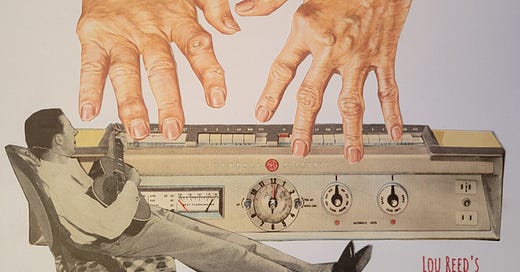E19. Lou Reed's Nephew on Writing
“It’s ridiculous when you think about it. Scratchings meant to represent life? How we ever convinced ourselves words could do this is a mystery.”
“So how is the article going?” I asked a few weeks later.
Lou Reed’s Nephew had been quiet all morning.
“What article?”
“The article about your implausible but narratively dynamite victory at the Indian Poker World Championship.”
“I’m not doing that anymore,” he said.
“Why?”
“Because writing is terrible.”
I was suspicious of this explanation. It sounded to me like his theory about the origins of Indian Poker had not panned out.
“But I thought you were a writer? You had an editor.”
“I didn’t know what I was getting into,” he said.
“Because?” I assumed he would now relate how he had run up against the truth-telling constraints that came with his new line of work.
“Because writing is useless,” he said. “Completely inadequate to its purpose.”
“How so?”
“It’s ridiculous when you think about it. Scratchings meant to represent life? How we ever convinced ourselves words could do this is a mystery.”
“Necessity, I suppose.”
“Necessity?” he scoffed.
“There came a time when we wanted to transmit symbols beyond ourselves, beyond what we could do by singing songs and telling stories. We needed a technology for transmitting speech, on paper or iPhone screens.”
“Okay, Derrida.”
“You are familiar with Derrida?” This surprised me.
“Žižek does a rude imitation of him. And I’ve seen him on YouTube. Devastatingly handsome, Derrida, but shorter than you’d expect.”
“So writing was this technology—the first platform, though clearly not the last, for telling and sharing stories—and it spread for thousands of years, until now, when it is totally mainstream.”
“Was,” Lou Reed’s Nephew corrected. “Writing is past its prime. Why write when you can talk? Or FaceTime. We made an inevitability out of a temporary necessity, but it becomes clearer every day what a weak workaround writing always was.”
“I used to write,” I said.
“Who didn’t? It’s like typing.”
“I mean for a living.”
“From the speaking fees? Or did you have Patreon back then?”
“You used to be able to get paid for writing itself,” I said. “Enough to live on.”
He didn’t know what to make of this. Writing for a living? I had to remember how it had worked myself.
I would go to things—“events” Ulugbek and I now called them—and talk to people and write down what they said on slips of paper bound together with metal coils, being careful to spell their names correctly because there would be no way to check them later. Then I would take these notes back to an office and type them into a computer with a screen that only had two colors: black and a sickening, flickering green. A question might come up. I would take out the phone book (which was larger than a medieval Bible, with pages just as thin) and call someone to answer it, then—after being edited by several different people, each of whom made them better—these words would be printed out and glued to pieces of poster board with the help of a tiny rolling pin and a machine that excreted hot glue.
There were people in another part of the building who I never had to talk to—was in fact discouraged from talking to—who sold other pieces of paper, paid for by advertisers, which were then glued down in the margins around what I had written. Once a week, these boards were sent somewhere, photographed, and transferred onto the cheapest paper available. Bundles of these would be chucked from trucks onto the streets and bar doorsteps of the city so people could find things to do. Then I went to more events, talked to more people, and did it all over again. The fifties were still visible, and the nineteenth century wasn’t far behind.
“Why did you stop?” Lou Reed’s Nephew asked.
There were two answers, and I wasn’t sure which one I wanted to share with Lou Reed’s Nephew. The first was practical. I kept being presented with the choice between writing and overseeing ever more complex systems involved in the storing and distribution of “content,” as writing quickly became known. The sites and feeds and channels and networks. Writing was hard. It always had been, perhaps because Lou Reed’s Nephew was right: It was a flawed, transitional technology.
The systems on the other hand—all those pieces of paper from writers and advertisers replaced by relational tables that could blend them in infinite, dynamic combinations—were predictable and (in their way) sublime. Plus working on them to turn writing into content paid better than writing itself. Much better. Lou Reed’s Nephew might have appreciated the cynicism of this outcome, but I was ashamed of it. I imagined Todd Blin, a thirteen-year-old juvenile delinquent in a tie and blazer, giving me the finger.
But there was another reason, even harder to admit, which is that everyone was a writer now, and I didn’t want to be a writer in a world where everyone was a writer. I wanted to be special.
“I’m not sure why,” I said, only to realize that Lou Reed’s Nephew had slipped out of his cube without making a sound.




